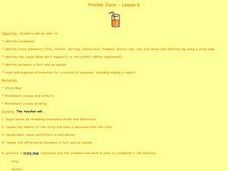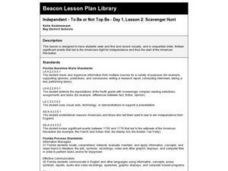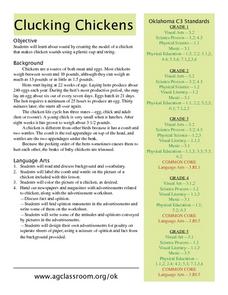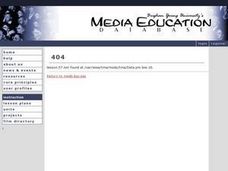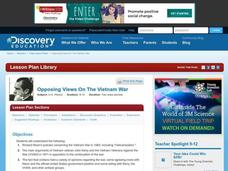Learning to Give
It's Never Too Late: Air Quality
What are the causes and effects of pollutants on the quality of the air we breathe? Groups research emission standards, emission controls, career opportunities in the area of air quality control, and things government and individuals can...
Global Oneness Project
The Consciousness of Nature
Scholars voice their opinions about animal consciousness with an article that challenges common ideas about nature. After reading the article, learners engage in a thoughtful discussion before writing out their arguments in a persuasive...
Curated OER
Freckle Juice- Lesson 6
Students read Freckle Juice. In this comprehension lesson, students complete a story map and discuss cause and effect based on readings from Freckle Juice.
Curated OER
Inference Lesson Plan
Students practice assessing graphics to infer and identify an author's implicit and explicit meaning in a piece of text. They evaluate the effectiveness of information found in maps, charts, tables, graphs, diagrams, cutaways and through...
Curated OER
Independent - To Be or Not Top Be - Day 1, Lesson 2: Scavenger Hunt
Fifth graders research the thirteen significant events that lead to the start of the American Revolution.
Curated OER
Independent - To Be or Not Top Be - Day 2, Lesson 3: In the Course of Human Events
Fifth graders practice scanning skills to answer questions on the French and Indian War.
Curated OER
Trap Door Reading: Persuasive Text
Young scholars create T-charts to analyze persuasive text. In this persuasive text instructional activity students make predictions based upon titles and learn how to make arguments based on facts.
Curated OER
ANALYZING RUMORS AND MYTHS
Eleventh graders explore the phenomenon of "disinformation" that often circulates during a crisis. In this American Government lesson, 11th graders analyze an article on myths and rumors.
Curated OER
Reading The Flag Maker
Learners explore The Flag Maker. In this reading comprehension lesson, students listen to the book The Flag Maker, making predictions and answering questions during the reading. Learners locate facts and opinions within the book and...
Curated OER
Clucking Chickens
A comb, wattle, and beak are three characteristics that describe a chicken. Your class can explore the life of a chicken through reading, art, movement, and music. Using a plastic cup and string, they'll create a pretend chicken that...
Curated OER
What is Diabetes?
Students examine basic information about diabetes and related vocabulary words. They explore various health websites, complete a worksheet, discuss the worksheet answers and discuss diabetes myths vs. facts.
Curated OER
The Farmer Cares for the Land
Students explore farming by creating visual demonstrations. In this agriculture lesson, students read assigned text about a farmer's duty and identify the events that have taken place in the history of agriculture. Students collaborate...
Curated OER
Women Monarchs And Heads Of State
Students explore the rule of women throughout history. In this world history lesson, students participate in a panel discussion which requires them to share the strengths and weaknesses of selected women rulers.
Curated OER
The Furry News: How to Make a Newspaper
Students investigate the process of making a newspaper using children's literature to create context for the lesson. The readers are asked to predict the events of the story as it is read to them. Then the teacher uses guided questions...
Curated OER
Conflict Resolution in 9 Easy Steps
Students investigate student psychology by reading assigned text about nonviolence. In this conflict resolution instructional activity, students read nine specific steps they should take the next time they are in an argument with...
Curated OER
Body and Media #1
Young scholars examine how films and media affect their body image. They identify their own definition of body image and research the topic. They discover the importance of using both fact and opinion sources.
Curated OER
Backward Lesson
Students view a copy of the painting "Last Moment of John Brown (1884). They discuss the content and composition of the painting. Important questions to be answered during the discussion are included with the lesson plan. They write an...
Curated OER
Persona Interests, Likes, and Dislikes
Students practice listening to and discussing their personal interests and opinions. In this communication lesson, students listen as the teacher talks about his/her personal interest. They work with a partner to verbally share their own...
Curated OER
Theories of Crime and Punishment
Students examine goals of two major theories of punishment, Utilitarian Theory and Retributive Theory, develop opinions about ethics and effectiveness of both theories, define legal duties of prosecutors and public defenders, and discuss...
Curated OER
Thomas Jefferson on the Sedition Act
Young scholars research and cite arguments Jefferson used in objecting to the Sedition Act. They discuss Jefferson's opinion on how constitutional questions about the Sedition Act could be resolved.
Curated OER
White Collar Crime
Students discuss difference between crimes of deceit versus crimes of violence, define white-collar crime, and examine far reach of white collar crime laws. Students then analyze what differences exist between rationales for punishing...
Curated OER
Opposing Views on the Vietnam War
High schoolers consider opinions regarding the Vietnam War. In this Vietnam lesson, students compare Nixon and Johnson's policies about the war. High schoolers also research the anti-war movements as well as the sentiments of the those...
Curated OER
Exploration of Mars
Young scholars explore the three-phase strategy used by NASA for scientific exploration. In this space science lesson, students research past missions to Mars. They share their discoveries and create a timeline as a class.
Curated OER
Respect, Prejudice, and Race
Students' examine their opinions about respect, race, and stereotypes and their beliefs as a group. They complete a short questionnaire and then write an essay on reducing prejudice and discrimination.




